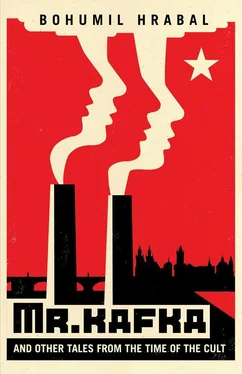I’m thinking of you, my Poldinka, remembering how you told me: “You I hate least of all. In your saliva, I taste a bottomless pit excavated by love. In your teeth, I touch a wall dripping with sadness. Darling, you had salami for supper, because I have a piece of meat on my lips, but it doesn’t matter; kiss me and kiss me again, and again chew the flesh around the hollows of my eyes, around the chasm of my mouth. And say it again, that even Solomon in all his glory was not arrayed like this, nor are the birds of the air, nor the lilies of the field as comely as I. Say it again and again. Ignite fiery sacrifices between my legs, set my loins aflame. And when you go home in the morning and see a dress hanging in the window, think nothing of it. It’s just me embracing a building charged with sweet memory. They say you can still feel the lost needles of sunlight in the railings.”
That was what Poldinka told me back then. We were strolling down to the river where the city walks on its hands. I wondered then why the cars were driving along the river upside down, their wheels in the air, as though sledding along on their roofs, and why passersby greeted each other as though they were scooping water into their hats.
Poldinka said, “Where do you find the strength to deal in those idiotic toys, toothbrushes, and combs, and still have such wild dreams?”
I said: “Poldinka, you alone have understood the words with which I have inundated your mouth, your hair, the air in your lungs: tiny words plucked from the evening papers. Poldinka, you alone have always known when the wick in my eyes has been trimmed, you alone understand what will remain when I depart, my face leaden and unhearing, because like you, I have never wanted to take my pleasure by the book; like you, I have never wanted to forfeit my right to pain and grief. .. But why Poldinka, you perverse, deviant, degenerate woman, why do you bring panic into my life, like a stalactite, like a vampire bat?”
I jump up from the bench in the Old Town Square. A policeman is standing in front of me, his legs apart, his sleeves dipped in quicklime. There’s no one around, so I confide in him.
“From this day on, I will never again be free of the desire to walk with the Aramaic professor of laughter, you know? From now on, I will never be rid of the cracks in my brain, because to be free is a joy. And so I’m drowning in happiness itself — in weddings, in pleasure — as I work at the Zinner Brothers, checking off turtle doves, Easter eggs, souvenir chapels, angel hair, Christmas decorations, toys. Do you understand? We are all brothers, brothers in l’art pour l’art , as beautiful as entartete kunst , as truthful as a nightingale, as perverse as a rose. Do you really see what I’m saying? You can’t live without cracks in the brain. You can’t rid yourself of freedom the way you’d rid yourself of lice, brother. Do you understand?”
The policeman’s reply was harsh: “Don’t carry on like that, Mr. Kafka. Why are you shouting? You’ll end up with a fine for disturbing the peace.”
A steel chain, each link polished by proletarian hands, sparkled in ribbons of sunlight that poured through the louvers of the ventilation tower running the length of the factory hall. The chain was hanging from a motionless overhead crane, and the crane operator was dozing in the gondola, her white forearm stretched along the ledge of the cab, her bleached blonde head resting on her elbow. A shaft of sunlight bisected her head and arm.
The shift foreman, Podracký, walked down the hall through band after band of light, as the sun cast stripes on his coveralls. He walked through section three, then section four, moving through blue twilit tunnels, then emerging again into clear, diagonal swathes of light pouring through the half-open louvers.
Now he walked past silent grinding machines and their carborundrum discs, dangling idly from dusty chains. The grinders were sitting on benches by the sorting table; some were reclining on slanting planks, knees up, their arms folded behind their heads, like extras waiting in the wings for their cues.
“If I understand your message correctly,” said the shift foreman, “you don’t intend to continue working. What exactly do you think you’re up to?”
“What you did to us flies in the face of the principles of comradely conduct,” said one of the grinders, nicknamed The Dairyman. He stepped forward. “You’re just like the kids who write ‘Kilroy was here’ on the wall and then run away.”
“In other words, you’re on strike,” said the foreman, raising his eyebrows.
“No, we’re just not going back to work until we can talk to the person who’s meant to negotiate these new quotas with us, according to regulations.”
“Right, then. I’ll send round the shop steward,” said Podracký, and he pulled out a yellow folding ruler, measured the sorting table, refolded the ruler and walked away, slapping it against his thighs to the rhythm of his step. The overhead crane began to move toward him, drawing closer as the blonde operator propelled the vehicle through the shafts of light. She pushed a lever, and, as the crane advanced down the hall, its trolley simultaneously moved across the gantry, the hoist descending on its glistening steel chain. The operator’s ample bosom rippled as she passed in and out of the bands of sunlight. The crane passed over the grinders’ heads.
The Judge brought a helping of blood pudding from the canteen for the senior worker. Then he went back to the pickling vats, where slabs of steel were soaking in hydrochloric acid. He accidentally stepped into a puddle of spilled acid and began to feel the liquid silently working away. He heard his shoe laces snap, so he rested his foot on the rim of the trough and watched as the fabric of his twill trousers began pulling apart. He looked up at the pile of scrap. A welder was patiently cutting his way into the innards of an old Wertheim safe with a blue oxyacetylene flame. Past him, on the scrap heap, some female convicts were unloading freight cars filled with rusty crucifixes taken from village churchyards. Working in pairs, they grasped an iron crucifix at each end, then swung the corroded symbol of Christianity straight into a waiting hopper. Then they loaded the hoppers up with the charred remnants of tanks, iron railings, ornamental grave markers, swan-like enamel bathtubs, sewing machines, congealed wrench sets, all of it scorched by incendiary bombs, because such raids in World War II set the earth itself on fire.
The Judge reached up and grabbed the control pendant hanging from the trolley and pressed a button, but the hoist moved off in the opposite direction.
“Stop it, doctor, stop it, or we’ll crash it into the gondola!” shouted Vindy, the assistant.
The Judge pressed the button, and the hoist came to a halt. Now all he had to do was press the other button. The hoist inched forward, and the Judge followed it along the wobbling boards. Gripping the pendant like a coachman holding the reins of a four-in-hand, he vanished into a greenish cloud of acidic vapor and reemerged on the other side.
“That’s it,” said Vindy. “That’s far enough.” The Judge pressed the button. This time, it was the right one.
On the scrap heap, the female convicts slid open the door of a freight wagon, and fire-damaged gramophones tumbled out, sparkling with teardrops of blue glass, remnants of window panes that had melted when the factory was hit with phosphorus bombs.
“Very well,” said the Frenchman, “but what if we get crappy material, and the entire ingot has to be ground down?”
“It’s all been speed-smelted,” said the grinder with a cruciform scar under one eye. “Last time they fired up ‘Daniel,’ they played music at the furnaces to celebrate the fourteen charges they pushed through in twenty-four hours. That broke the record for a Siemens-Martin, but one of the rollers says to me he’d have all those fuckers and their bright ideas up before a judge, because the billets they rolled from those famous fourteen charges? Half of them had to be scrapped and sent back for resmelting.”
Читать дальше












